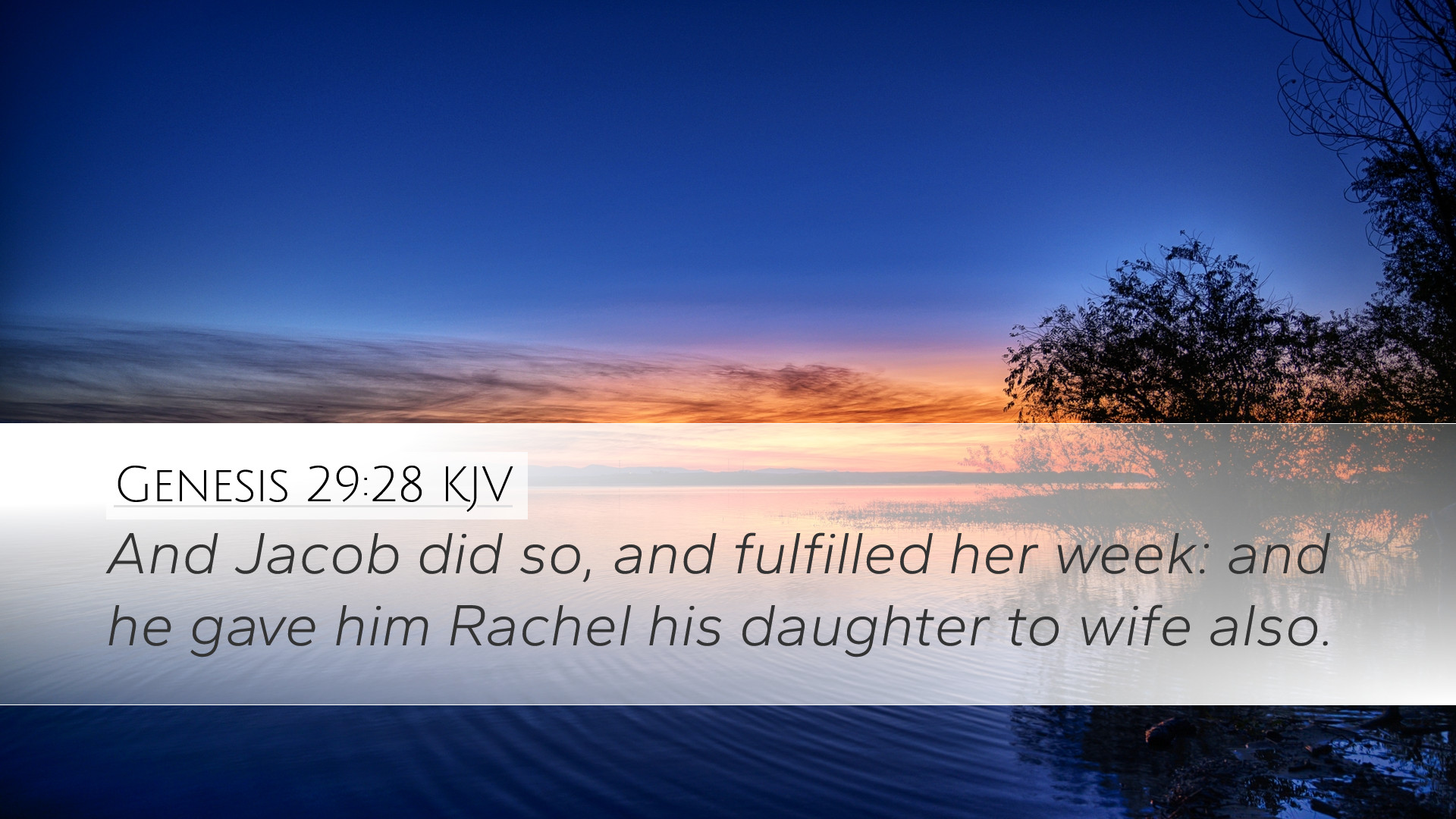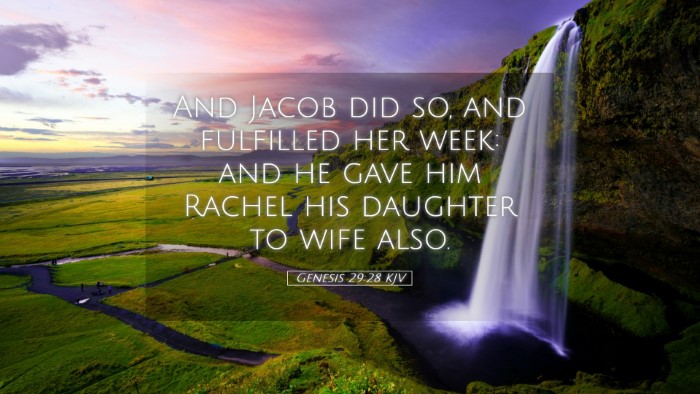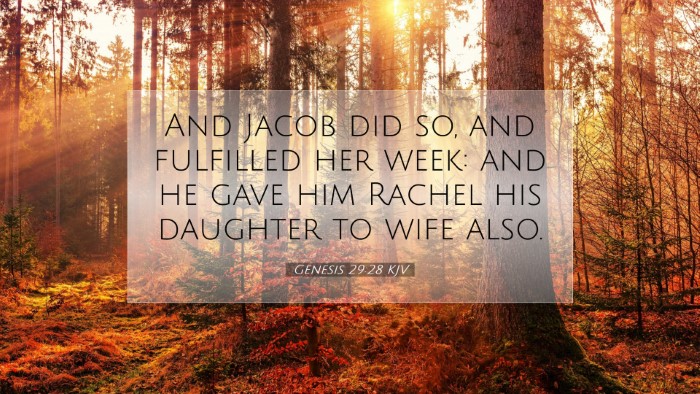Commentary on Genesis 29:28
Genesis 29:28 states: “And Jacob did so, and fulfilled her week: and he gave him Rachel his daughter to wife also.” This verse marks a pivotal moment in Jacob's life, bridging his servitude with Laban and his marital commitments. The exploration of this verse benefits from insights drawn from various public domain commentaries, bringing depth and clarity to the theological and historical implications.
Overview and Context
The narrative takes place in a culturally rich context where marriage customs and familial obligations are paramount. Jacob, having fled from his brother Esau, encounters Laban and becomes entrapped in a cycle of labor and deception. This particular verse concludes a week of celebration following the marriage to Leah, Laban's elder daughter, after which Rachel is introduced as a new bride.
Thematic Elements
- Deception and Justice: The theme of deception is prevalent throughout this segment of Genesis. Laban's trickery in marrying off Leah rather than Rachel is echoed in Jacob's own past deception of Esau.
- God’s Providence: The unfolding of events reflects God’s overarching plan despite human failings. God is depicted as sovereign, ensuring that His covenantal promises to Jacob are upheld.
- Polygamy and Familial Strife: The verse underscores the complexities of polygamous relationships and sets the stage for the familial discord that will arise among Leah, Rachel, and their children.
Exegetical Insights
Matthew Henry's Commentary
According to Matthew Henry, this verse points to the fulfillment of Jacob’s servitude under Laban. Henry recounts that "Jacob completed the week of celebrations customary for the marriage, signifying an enduring commitment to both Leah and Rachel." He emphasizes the “equality of status” given to Rachel as the beloved wife through this act.
Albert Barnes' Commentary
Albert Barnes notes the significance of Jacob’s actions: "By fulfilling her week, Jacob acknowledges the cultural expectations associated with marriage." Barnes argues that this completion illustrates Jacob's compliance and his internal struggle with emotional ties to both Rachel and Leah. He further highlights the consequences of Laban’s duplicity leading to unresolved animosities that permeate the rest of Genesis.
Adam Clarke's Commentary
Adam Clarke provides additional insights into the cultural practices of the time, explaining that the week-long feast following a marriage was not only a sign of celebration but also a challenge of loyalty for Jacob: "He now finds himself in a position where his affections are split, a foreshadowing of the conflicts that arise later in the narrative.” Clarke underscores the emotional and spiritual implications of Jacob's decision, recognizing the subsequent trials as integral to his transformational journey.
Theological Implications
The exchange of Leah for Rachel deepens the theological discourse surrounding divine selection, favor, and the establishment of lineage. Jacob's dual marriages are paralleled by God’s enduring covenant with Jacob, reflecting both grace and judgment in God’s dealings with humanity.
This verse also acts as a precursor to the nation of Israel's future, wherein the dynamics of love, jealousy, and divine choice will shape Israel's identity. The implications of Rachel's later barrenness and Leah’s fertility create an ongoing tension between the two sisters, reflecting the covenantal themes of struggle and blessing within biblical narratives.
Pastoral Applications
For pastors, Genesis 29:28 serves as a rich text for discussing the nature of relationships, covenant, and God’s providential guidance in the face of human flaws. The exploration of Jacob's emotional turmoil can resonate with congregants experiencing relational complexities.
- Encouraging Authentic Relationships: Pastors may encourage honesty in relationships, drawing lessons from the deceptions that permeate Jacob’s life.
- Emphasizing God’s Sovereignty: This passage starkly illustrates the sovereignty of God amidst human struggles, a reminder that God is actively at work in difficult situations.
- Addressing Familial Dynamics: The dynamics seen in Jacob's family provide a platform to address contemporary familial issues within the church community.
Conclusion
Genesis 29:28 encapsulates the intertwined themes of love, deception, and divine sovereignty amidst human relationships. Insights from commentators like Matthew Henry, Albert Barnes, and Adam Clarke illuminate how this verse foreshadows the future narrative of Israel while also serving as a mirror reflecting the complexities of human emotion and divine intention.
As pastors, students, theologians, and scholars reflect upon this segment of Scripture, it calls for deeper contemplation of God’s faithful orchestration of life’s narrative, weaving in the strands of human agency, covenant, and promise.


